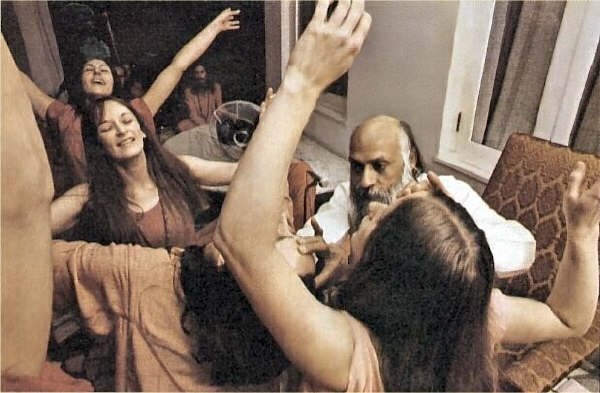BELOVED OSHO,
I HEAR YOU OFTEN SAYING THAT THE UNCONSCIOUS IS THE BASEMENT OF OUR MIND WHERE WE THROW ALL UNPLEASANT AND REPRESSED PARTS OF THE EXPERIENCES WHICH WE HAVE GONE THROUGH IN MANY LIVES BECAUSE OUR CONDITIONING DIDN'T ALLOW IT TO BE PART OF THE CONSCIOUS SPHERE. WHAT HAPPENS WITH THE BEAUTIFUL SPIRITUAL EXPERIENCES WE HAVE HAD IN SOME LIVES? THROUGH SELF-HYPNOSIS I HAVE BEEN ABLE TO REMEMBER A LOT OF SUCH EXPERIENCES. IS THERE A TREMENDOUSLY HELPFUL TREASURE OF POSITIVE EXPERIENCES THAT WE CAN RETRIEVE?
Any experience that is spiritual cannot be unconscious; by its very nature it has to be part of the superconscious. Just as the unconscious collects all that is ugly, nightmarish, all that we don't want ourselves to know or others to know about, in the same way the superconscious also collects all that is beautiful, magnificent, spiritual.
As one passes from one life to another, neither does one remember the unconscious nor does one remember the superconscious. One comes only with the conscious part of the mind, and the journey starts again — although what has been experienced before is retained and will be helpful.
If your unconscious is too loaded, it will affect your conscious so that it repeats the same kind of ugly experiences that you wanted to avoid, but if your superconscious has a treasure of beautiful experiences it will attract the conscious so that it moves very easily towards the superconscious.
So in hypnosis it can happen: if your unconscious is less powerful than your superconscious, then in hypnosis you will go towards the superconscious and you will enter into those treasures.
But they don't belong to the unconscious. When for the first time you see them you will think that you were unconscious of them. That is true: you were unconscious of them, but they were not part of the unconscious mind; they were part of the superconscious, but you were not aware of it.
All these six different sections of the mind — leaving aside the conscious mind, which is your day-to-day working mind — have a memory system of their own.
In each life whatever you attain, or lose, becomes part of some memory system. If it is on the dark side, it goes towards the unconscious. If it is so dark that even the unconscious feels that it is too heavy for it, then it slips deeper towards the collective unconscious. But if the collective unconscious also feels that it is really the worst that can happen, then it slips into the cosmic unconscious, which is ready to take anything because it is just rocklike; it does not bother what it is.
The same happens on the light side, but most people don't get to the superconscious. Once in a while, if somebody has been working to develop his being and not just growing old but growing up, then a few things are treasured by the superconscious. But if the man goes on there will come a time when there will be things which can be treasured only on a higher level than the superconscious. And that will be the memory system of the collective superconscious.
But there are few experiences which can be collected only by the cosmic superconscious, and in every life the way upward becomes narrower.
Out of thousands perhaps one person may collect something in the superconscious; out of millions perhaps one person may collect something in the collective superconscious; out of billions maybe one person collects something in the cosmic superconscious.
As you are born, you are born into the conscious mind, which knows nothing about the treasures or dragons that you are carrying in the unconscious. But a little work and you will become aware. If something is on the higher levels, then immediately your consciousness will become part of the superconscious, even for moments, in hypnosis.
I have worked on many people. Very few people have memories in the superconscious, and they are surprised when they do come to remember any, because they always thought, according to Western psychology, that everything that is repressed, unlived, is ugly and that it is in the unconscious.
They are very puzzled because this cannot be repressed: one is so ecstatic about it that one would like the whole world to know about it, that it is true, that it happens. The question of repression does not arise.
But in the change from one life to another life, just so that you don't remember your past life, the mechanism is such that you remember nothing — not the unconscious or the superconscious, or beyond.
You come with a clean conscious mind, so a new upbringing, a new teaching, a new conditioning starts.
If all these seven layers were remembered, the child would be in much difficulty — as if you are teaching the child seven languages simultaneously. He would be confused, utterly confused. So it is a natural protection against being confused and mad, to keep only a small part moving each time into new life, fresh, so the new life can bring you its own ideology, religion.
I remember one girl who lived just a hundred miles away from Jabalpur in Katni. Her parents were puzzled because she remembered that in her past life she had been a small daughter in a family in Jabalpur, and she remembered dying; she must have been nine or ten when she died, and now she was not more than five. I knew the family in Jabalpur about which she was talking. I had come to know them accidentally because they had a garage just close to my house, so whenever something was wrong with my car I used to go there.
And a hundred miles away, in Katni, I used to go often to speak to a small group of seekers. There they brought the girl to me. They said to me, "She remembers this. What should we do? — because she is very confused. She is continually telling us to take her to her parents, her brothers — and they live in Jabalpur. She remembers the name." When they told me the name I said, "Then don't be worried. I will call them, and if she can recognize them in a crowd then there will be some proof of her memory."
In the evening I was going to address a big meeting, nearabout twenty thousand people, so I phoned the family and told them the whole story, and I told them to come as disguised as possible. "Don't use the same clothes as you used to when your sister died." And they said that their sister had died when she was about ten.
The whole family came, and I told them, "You stand or sit in different places in the meeting, and let the girl find you." The girl found everyone — everyone except the people who were born after her, little children.
Those whom she had left in her past life she immediately recognized. "He is my brother." She gave his name, his qualities, and she knew the mother, the father, the sister, even the servant. The servant had left them and he was serving somewhere else. They had brought him just to see whether she recognized the servant or not. She immediately recognized him and she said, "He was so loving to me."
Her case became very famous. Many psychologists came to study her, but her parents were torn apart and she was torn apart. And now the new family — that means the past life's family — were also torn apart. They wanted the girl back. To whom should the girl belong? Where should she go? She wanted both families to live together. That was not possible because this time she had been born in a brahmin family and the last time she had been born in a lower class. They could not live together — just the Hindu caste system.
And anyway, it was not feasible: they had their businesses, services, in Jabalpur and the other family had their businesses and things in Katni. It was not feasible for them to live together, but she was not ready to let go of anyone. So I said, "You do one thing: sometimes she can go and live with the family there in Jabalpur; sometimes she can come and live with you, so both families… And it is not far away — just two hours by road — so it is not a difficult problem."
But it was difficult, because when she left one family she would cry and weep because she did not want to leave that family — yet she wanted to go to the other family. Seeing the misery of that girl I suggested, "Let me hypnotize her. It is some kind of freak thing. Something has gone wrong in nature; otherwise everybody would be in this state."
And this is only a question of two lives: if you remember four, five, six, seven lives, you will be in a mess. You won't know what to do and what not to do. Time makes no difference. If you have loved a woman in the past life, you will again find yourself loving her; but what will you do with the woman you are loving now? You love her too!
Seeing her agony the parents agreed. She needed seven sessions of deep hypnosis to forget her past life, and then she was okay and healthy.
So it is a natural system that you forget the past, but nothing is lost; somewhere it is treasured. That's why it can be remembered. You only forget, it is not dropped out of your existence. It is stored either in the unconscious… mostly in the unconscious, because most people don't experience something which has to be treasured in the superconscious.
And any person who has a treasure in the cosmic superconscious is already ready for enlightenment. To go that high, to collect certain memories, means the person is ready to explode into the ultimate celebration.
So both are possible; you just have to look at the quality of the memory. If it is ecstatic, meditative, then rejoice in it: it is connecting you with past lives of meditation, where you stopped because of death. From there you can grow. Suddenly you have found a treasure to support you. But if it is only from the unconscious, then just become conscious and it will disappear.
OSHO


